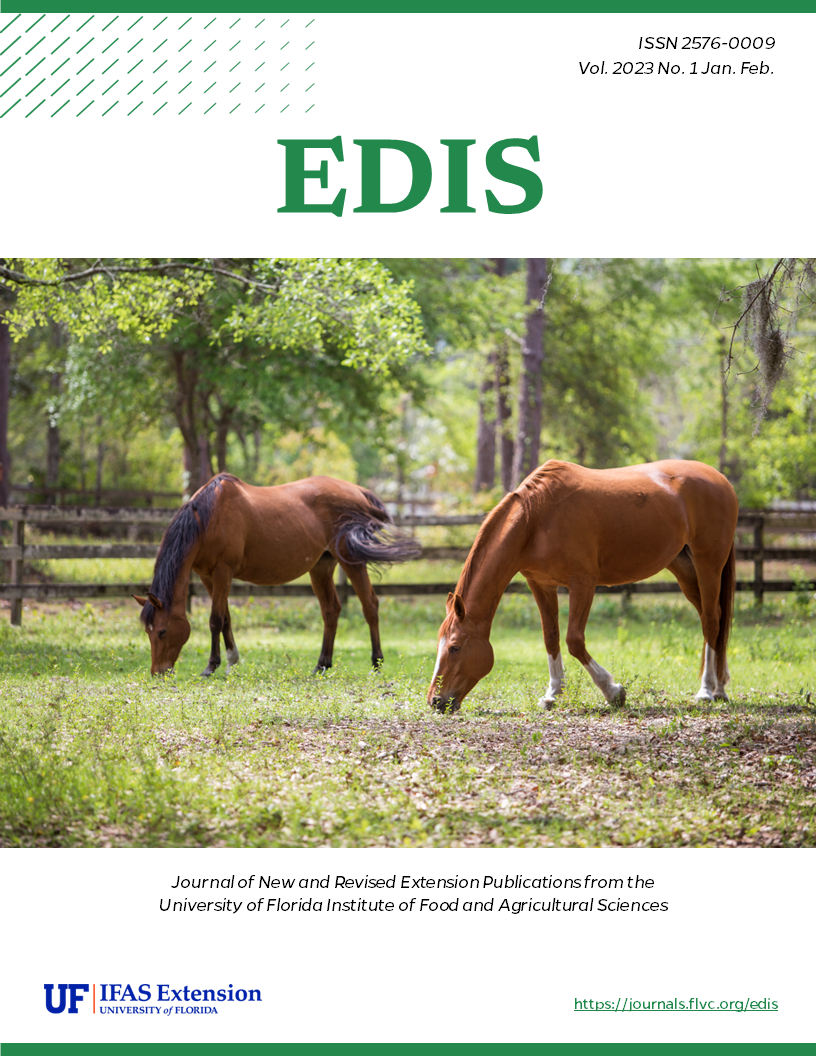Resumen
Keystone virus (KEYV) is an emerging negative-sense single-stranded RNA arthropod-borne virus (arbovirus) that can be transmitted to humans by the bite of an infected mosquito vector. This publication provides an overview of the KEYV distribution, potential vectors, transmission cycle, symptoms, diagnosis, and prevention.
Citas
Bond, J. O., W. M. Hammon, A. L. Lewis, G. E. Sather, and D. J. Taylor. 1966. “California Group Arboviruses in Florida and Report of a New Strain, Keystone Virus.” Public Health Reports 81:607. https://doi.org/10.2307/4592788
Burkett-Cadena, N. D., I. Hoyer, E. Blosser, and L. E. Reeves. 2019. “Human-Powered Pop-Up Resting Shelter for Sampling Cavity-Resting Mosquitoes.” Acta Tropica 190:288-292. https://doi.org/10.1016/j.actatropica.2018.12.002
Carpenter, S. J., and W. J. LaCasse. 1955. Mosquitoes of North America (North of Mexico). University of California Press, Berkeley and Los Angeles. https://doi.org/10.1525/9780520325098
Darsie, R. F., and C. D. Morris. 2003. “Keys to the Adult Females and Fourth Instar Larvae of the Mosquitoes of Florida (Diptera: Culicidae).” Technical Bulletin of the Florida Mosquito Control Association.
Evans, A. B., and K. E. Peterson. 2019. “Throw out the Map: Neuropathogenesis of the Globally Expanding California Serogroup of Orthobunyaviruses.” Viruses 11:794. https://doi.org/10.3390/v11090794
Evans, A. B., C. W. Winkler, and K. E. Peterson. 2019. “Differences in Neuropathogenesis of Encephalitic California Serogroup Viruses.” Emerging Infectious Diseases 25:728. https://doi.org/10.3201/eid2504.181016
Fine, P. E., and J. W. LeDuc. 1978. “Towards a Quantitative Understanding of the Epidemiology of Keystone Virus in the Eastern United States.” The American Journal of Tropical Medicine and Hygiene 27: 322-338. https://doi.org/10.4269/ajtmh.1978.27.322
Henry, C. J., A. N. Pillai, J. A. Lednicky, J. G. Morris Jr., and T. J. Hladish. 2022. “Ecology and Public Health Burden of Keystone Virus in Florida.” Epidemics 39:100555. https://doi.org/10.1016/j.epidem.2022.100555
Issel, C. J., G. L. Hoff, and D. O. Trainer. 1973. “Serological Evidence of Infection of White-Tailed Deer in Texas with Three California Group Arboviruses (Jamestown Canyon, San Angelo, Keystone).” Journal of Wildlife Diseases 9:245-248. https://doi.org/10.7589/0090-3558-9.3.245
LeDuc, J. W., W. Suyemoto, T. J. Keefe, J. F. Burger, B. F. Eldridge, and P. K. Russell. 1975a. “Ecology of California Encephalitis Viruses on the Del Mar Va Peninsula. I. Virus Isolations from Mosquitoes.” The American Journal of Tropical Medicine and Hygiene 24: 118-123. https://doi.org/10.4269/ajtmh.1975.24.118
LeDuc, J. W., J. F. Burger, B. F. Eldridge, and P. K. Russell. 1975b. “Ecology of Keystone Virus, a Transovarially Maintained Arbovirus.” Annals of the New York Academy of Science, 266:144-51. https://doi.org/10.1111/j.1749-6632.1975.tb35095.x
Lednicky, J. A., S. K. White, C. J. Stephenson, K. Cherabuddi, J. C. Loeb, N. Moussatche, A. Lednicky, and J. G. Morris Jr. 2019. “Keystone Virus Isolated from a Florida Teenager with Rash and Subjective Fever: Another Endemic Arbovirus in the Southeastern United States?” Clinical Infectious Diseases 68:143-145. https://doi.org/10.1093/cid/ciy485
Parkin, W. E., W. M. Hammon, and G. E. Sather. 1972. “Review of Current Epidemiological Literature on viruses of the California Arbovirus Group.” American Journal of Tropical Medicine and Hygiene 21:964-978. https://doi.org/10.4269/ajtmh.1972.21.964
Plowright, R. K., C. R. Parrish, H. McCallum, P. J. Hudson, A. I. Ko, A. L. Graham, and J.O. Lloyd-Smith. 2017. “Pathways to Zoonotic Spillover.” Nature Reviews Microbiology 15:502-510. https://doi.org/10.1038/nrmicro.2017.45
Riles, M. T., and C. R. Connelly. 2020. “An Update of the Mosquito Records of Florida Counties, USA.” Journal of the American Mosquito Control Association 36:107–111. https://doi.org/10.2987/20-6923.1
Roberts, D. R., and J. E. Scanlon. 1979. “An Evaluation of Morphological Characters for Separating Females of Aedes (Ochlerotatus) atlanticus Dyar and Knab and Aedes (Ochlerotatus) tormentor Dyar and Knab (Diptera: Culicidae).” Mosquito Systematics 11: 203-208.
Shroyer, D. A., B. A. Harrison, B. J. Bintz, M. R. Wilson, C. B. Sither, and B. D. Byrd. 2015. “Aedes pertinax, a Newly Recognized Mosquito Species in the United States.” Journal of the American Mosquito Control Association 31:97-100. https://doi.org/10.2987/14-6447R.1
Sudia, W.D., V. F. Newhouse, C. H. Calisher, and R. W. Chamberlain. 1971. “California Group Arboviruses: Isolations from Mosquitoes in North America.” Mosquito News 31:576-600.
Taylor, D. J., A. L. Lewis, J. D. Edman, W. L. Jennings. 1971. “California Group Arboviruses in Florida.” American Journal of Tropical Medicine and Hygiene 20:139-145. https://doi.org/10.4269/ajtmh.1971.20.139
Tyler-Julian, K., L. E. Reeves, A. Lloyd, and D. Hoel. 2022. “Aedes pertinax and Culex interrogator: Two Mosquito Species New to Lee County, Florida.” Journal of the Florida Mosquito Control Association 69:16-20. https://doi.org/10.32473/jfmca.v69i1.130621
Watts, D. M., C. L. Bailey, N. T. Roberts, R. F. Tammariello, J. M. Dalrymple, and G. C. Clark. 1988. “Maintenance and Transmission Of Keystone Virus by Aedes atlanticus (Diptera: Culicidae) and the Gray Squirrel in the Pocomoke Cypress Swamp, Maryland.” Journal of Medical Entomology 25:493-500. https://doi.org/10.1093/jmedent/25.6.493
Watts, D.M., J. W. LeDuc, C. L. Bailey, J. M. Dalrymple, and T. P. Gargan. 1982. “Serologic Evidence of Jamestown Canyon and Keystone Virus Infection in Vertebrates of the DelMarVa Peninsula.” American Journal of Tropical Medicine and Hygiene 31:1245-1251. https://doi.org/10.4269/ajtmh.1982.31.1245
Wills, W., V. Pidcoe, D. F. Carroll, and J. E. Satz. 1974. “Isolation of California Group Arboviruses from Pennsylvania Mosquitoes – 1971, 1972.” Mosquito News 34:376–381.

